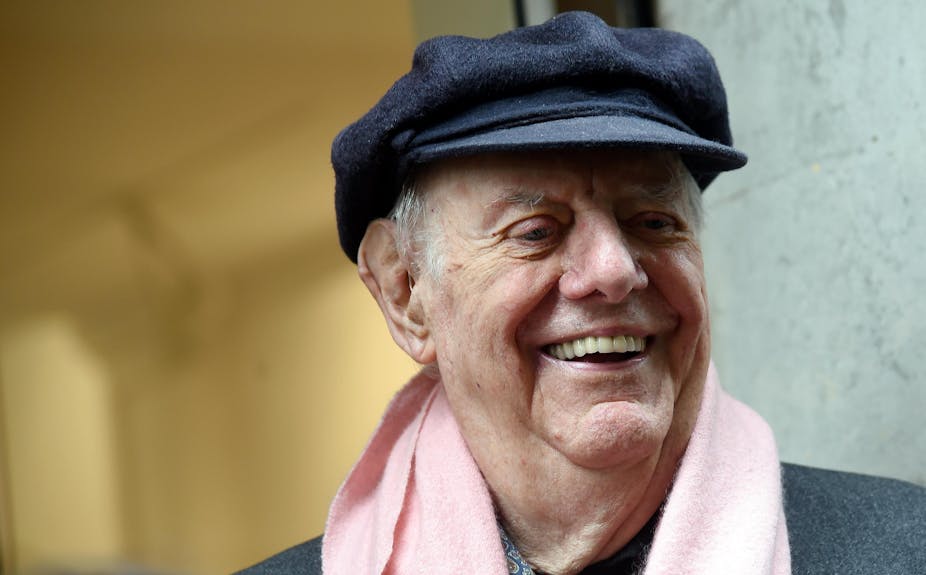On the same day a new Nobel laureate for literature was inducted, the curtain fell on the life of another, the maverick Italian playwright and 1997 Nobel winner Dario Fo, who has died aged 90.
It is a fine coincidence that this year’s Nobel Prize in Literature went to singer and songwriter Bob Dylan, not a man of literature in the strictest sense, and like Fo, not a conventional figure either. The judges’ decision to award the Nobel to actor, director and writer Fo was not without controversy in 1997 for the same reason that he was, like Dylan, not considered worthy of the literary title.
Beyond ill-fitting associations, however, Dario Fo – known as il giullare (“the jester”) – is of such a stature as to stand very few comparisons. Author of more than 80 plays, he was an enormously influential playwright and theatre-maker, an innovative craftsman of storytelling with strong anti-institutional convictions which led him into frequent clashes with Italy’s rich and powerful.
Born in the small Lombardy town of Sangiano in 1926, in 1940 he left for Milan to train at the Brera Fine Arts Academy. After the war he worked as a set designer, before joining Italian national broadcaster RAI as an actor and writer of satirical sketches. Much of his career was marked by a life-long partnership with his wife Franca Rame – daughter of travelling theatrical players and herself an actress and playwright. In 1960, they formed the Fo-Rame company and his work reached new heights, from comedic sketches to satirical comedies. She died in 2013.
His first major work, Mistero Buffo (Comic Mystery), was first staged in La Spezia in 1969. Making sweeping strikes at politicians and the church, the play’s narrative was based on story-telling in the form of episodic monologues. It also uses grammelot, gibberish talk that mixes dialects of different origins with mime to say what words sometimes cannot.
Storytelling that derives from oral traditions and street theatre, linguistic experimentation and satire are the backbone of Fo’s work. He looked back to the theatrical past, feeding off the medieval jester tradition and moving it forward with force and imaginative verve. Satire was his political activism, one informed by gross inequality and institutional corruption. Above all his theatre was a mirror, reflecting events taking place in Italy – in some cases, his productions changed from one evening to the next, capturing the daily shift of current affairs.
A dangerous game
Inspired by the 1969 death of anarchist Giuseppe Pinelli, the following year Fo wrote Morte accidentale di un anarchico (Accidental Death of an Anarchist). It is his classic play that denounces the injustices of the judiciary system and reenacts the interrogations that allegedly preceded Pinelli’s “accidental” death.
Fo and Rame’s long and difficult creative journey of political activism saw him position himself with the far left, but it was not without risk of retribution. Personal attacks reached their nadir in 1973 when Rame was abducted by a group of Fascists, beaten, raped and left for dead. Many times Fo was refused entry to the US due to his communist convictions. The Vatican was one of Fo’s major critics, especially due to Mistero Buffo’s references to the apocryphal gospels, those that had been excluded from the Bible.
But Fo – and Rame, too – were uncompromising in the face of censorship. He was independent of spirit, and committed to exposing the dark side of society. But his work was never gloomy; in it lived a playfulness and entertainment value that attracted worldwide and widespread popularity. One could argue that he kept faithful to creating a theatre that could speak to the people at many levels, not only the intellectual middle class.
Fo’s work was never just political satire. With irreverent absurdism, it included allegories of a world bigger than that of the politics of men. Not just the mafia, the church, or Italian institutions, his work spoke to the entire world where the poor and weak have no voice. His harshest critics claimed Fo himself was nothing more than a highbrow intellectual looking down on the people, but one cannot deny that he stood tall and would not bow to either artistic or political compromise.
We live in a world of fast packaged populism and easily digestible information. As Dario Fo takes a bow from the big theatre of life, I wonder how many more like him will rise to take a stand in the face of a world in which absurdity and inequality are forever on the rise.

